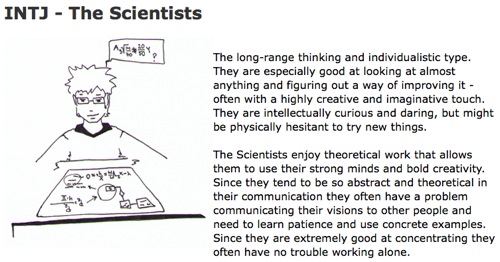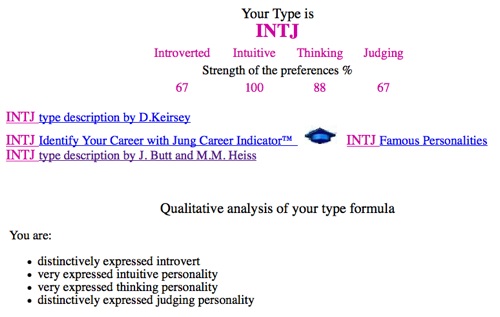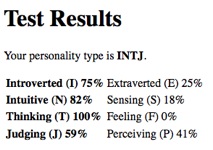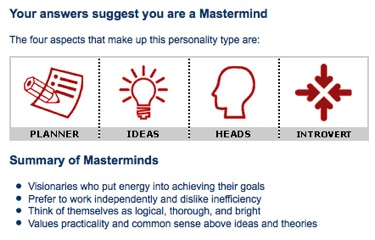“You can tell a lot about someone from what they’re like.”
…so said the wise Harry Hill. But it would seem that you can also tell a lot about someone from they way they blog. I came across a website yesterday called Typealyzer, thanks to Vicki Davis. Typealyzer analyses blogs and websites and does some clever semantic processing to decide which of the Myers-Briggs personality types the author fits into. As Vicki quite rightly pointed out in her post, there’s a great variety of personality types in the edublogosphere! What am I? INTJ (standing for Introversion, iNtuition, Thinking, Judgement):

I’m not a big fan of pigeon-holing people or stereotyping, so was a bit skeptical. Ironically, after some further research, I found that this is exactly what INTJ personality types are known for. This is from the Myers & Briggs Foundation website (my emphasis):
Have original minds and great drive for implementing their ideas and achieving their goals. Quickly see patterns in external events and develop long-range explanatory perspectives. When committed, organize a job and carry it through. Skeptical and independent, have high standards of competence and performance – for themselves and others.
What I am, and increasingly a fan of, are heuristics. These are rules-of-thumb and methods of problem solving that ‘just work’. My use of and belief in the power of heuristics fits in well with my Pragmatist outlook. If the sixteen personality types were all much-of-a-muchness and I could see myself in all of them, then I would dismiss the power of such talk. However, looking at the list, I’m certainly not anything like any of the personality types beginning with ‘E’ (for extroverted, presumably). In fact, the only other one remotely like me is INTP (the ‘P’ standing for Perception).
As Vicki Davis remarked in a follow-up tweet, the overviews tend only to talk about the positive traits of the personality types rather than including the negative elements. And then there’s the fact that Typealyzer looks at the web page towards which you direct it. As typing in dougbelshaw.com/blog would only take it to the front page of this site with summaries of blog posts, the results are likely to be distorted.
To gain some clarification and a second opinion, I searched for websites where you could take Myers-Briggs personality tests online. I took three. Here are the websites with the results underneath:
http://www.kisa.ca/personality
OK, I thought. Well this is just a test on someone’s homepage. And I may have just been answering the questions in a way that would get me to be INTJ. On with the next test…
HumanMetrics.com

OK, OK, but these aren’t exactly rigorous tests are they? So I searched for something with a bit more clout – and came across…
BBC – Science & Nature – What am I like?
So there we have it. I’m of the personality type INTJ. Apparently this is one of the rarest personality types! You can read more about INTJs at the BBC website, at PersonalityPages, or at Wikipedia. There’s some fascinating (at least, for me!) stuff in there.
If one of the most powerful things an individual can do in order to be successful and happy in life is to know thyself, then the quick Typealyzer blog test has got to be worth a try as a starting point.
What did YOU come out as?




 In late 2007 I helped bring together a group of UK-based educators with the intention of releasing regular podcasts about real-world educational technology. That group became known as
In late 2007 I helped bring together a group of UK-based educators with the intention of releasing regular podcasts about real-world educational technology. That group became known as 


![Reblog this post [with Zemanta]](http://img.zemanta.com/reblog_e.png?x-id=8c477c44-d37b-4c4f-a889-7fbf892bdcfc)